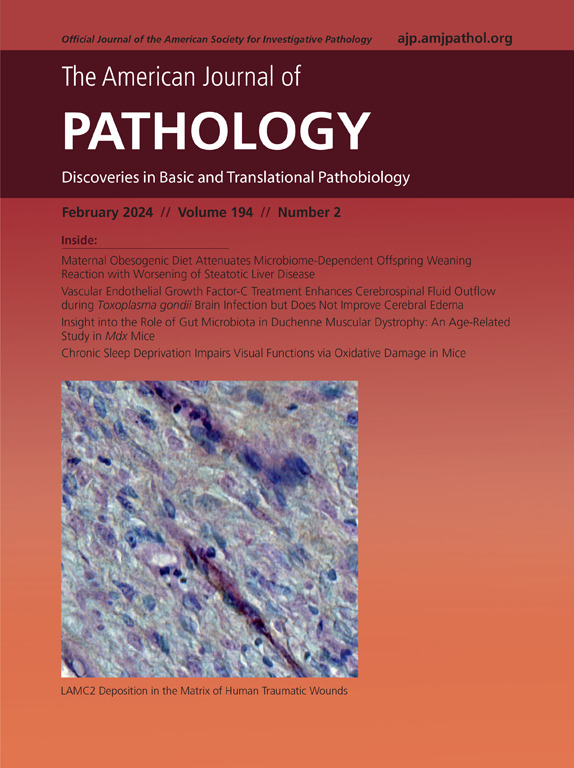胆管癌的遗传、表观遗传和微环境驱动因素
IF 4.7
2区 医学
Q1 PATHOLOGY
引用次数: 0
摘要
胆管癌(CCA)是胆道树上一种侵袭性和异质性恶性肿瘤,预后较差。为了更好地描述 CCA 癌变的特征,已经确定了遗传学、表观遗传学和微环境层面的多种特征。基因改变,如 IDH1/2、BAP1、ARID1A 和 FGFR2 的突变,在 CCA 发病机制中起着重要作用,在不同亚型、种族/民族和病因中存在差异。以 DNA 甲基化和组蛋白修饰为特征的表观遗传失调进一步加剧了 CCA 的复杂性,影响着基因表达和肿瘤行为。此外,CCA 细胞还与其他癌细胞和微环境中的浸润细胞类型(包括癌相关成纤维细胞、肿瘤相关巨噬细胞)交换自分泌和旁分泌信号,进一步形成支持肿瘤发生的免疫抑制龛位。本综述探讨了 CCA 的多方面遗传、表观遗传和微环境驱动因素。了解这些不同的机制对于描述 CCA 癌变的复杂途径和开发改善患者预后的靶向疗法至关重要。本文章由计算机程序翻译,如有差异,请以英文原文为准。
Genetic, Epigenetic, and Microenvironmental Drivers of Cholangiocarcinoma
Cholangiocarcinoma (CCA) is an aggressive and heterogeneous malignancy of the biliary tree that carries a poor prognosis. Multiple features at the genetic, epigenetic, and microenvironmental levels have been identified to better characterize CCA carcinogenesis. Genetic alterations, such as mutations in IDH1/2, BAP1, ARID1A, and FGFR2, play significant roles in CCA pathogenesis, with variations across different subtypes, races/ethnicities, and causes. Epigenetic dysregulation, characterized by DNA methylation and histone modifications, further contributes to the complexity of CCA, influencing gene expression and tumor behavior. Furthermore, CCA cells exchange autocrine and paracrine signals with other cancer cells and the infiltrating cell types that populate the microenvironment, including cancer-associated fibroblasts and tumor-associated macrophages, further contributing to an immunosuppressive niche that supports tumorigenesis. This review explores the multifaceted genetic, epigenetic, and microenvironmental drivers of CCA. Understanding these diverse mechanisms is essential for characterizing the complex pathways of CCA carcinogenesis and developing targeted therapies to improve patient outcomes.
求助全文
通过发布文献求助,成功后即可免费获取论文全文。
去求助
来源期刊
CiteScore
11.40
自引率
0.00%
发文量
178
审稿时长
30 days
期刊介绍:
The American Journal of Pathology, official journal of the American Society for Investigative Pathology, published by Elsevier, Inc., seeks high-quality original research reports, reviews, and commentaries related to the molecular and cellular basis of disease. The editors will consider basic, translational, and clinical investigations that directly address mechanisms of pathogenesis or provide a foundation for future mechanistic inquiries. Examples of such foundational investigations include data mining, identification of biomarkers, molecular pathology, and discovery research. Foundational studies that incorporate deep learning and artificial intelligence are also welcome. High priority is given to studies of human disease and relevant experimental models using molecular, cellular, and organismal approaches.

 求助内容:
求助内容: 应助结果提醒方式:
应助结果提醒方式:


